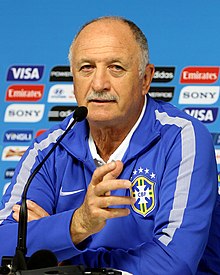
Back لويس فيليبي سكولاري Arabic لويس فيليبى سكولارى ARZ Luiz Felipe Scolari AST Luis Felipe Skolari Azerbaijani Луіс Феліпі Скалары Byelorussian Луіс Фэліпэ Скалары BE-X-OLD Луиш Фелипе Сколари Bulgarian লুইজ ফেলিপে স্কলারি Bengali/Bangla Luiz Felipe Scolari Breton Luiz Felipe Scolari Catalan
 Scolari at a press conference at the 2014 FIFA World Cup | ||||||||||||||||||||||||||||||||
| Personal information | ||||||||||||||||||||||||||||||||
|---|---|---|---|---|---|---|---|---|---|---|---|---|---|---|---|---|---|---|---|---|---|---|---|---|---|---|---|---|---|---|---|---|
| Full name | Luiz Felipe Scolari[1] | |||||||||||||||||||||||||||||||
| Date of birth | 9 November 1948[1] | |||||||||||||||||||||||||||||||
| Place of birth | Passo Fundo, Brazil | |||||||||||||||||||||||||||||||
| Height | 1.82 m (5 ft 11+1⁄2 in)[1] | |||||||||||||||||||||||||||||||
| Position(s) | Defender | |||||||||||||||||||||||||||||||
| Senior career* | ||||||||||||||||||||||||||||||||
| Years | Team | Apps | (Gls) | |||||||||||||||||||||||||||||
| 1966–1973 | Aimoré | |||||||||||||||||||||||||||||||
| 1973–1979 | Caxias | 67 | (0) | |||||||||||||||||||||||||||||
| 1980 | Juventude | |||||||||||||||||||||||||||||||
| 1980–1981 | Novo Hamburgo | |||||||||||||||||||||||||||||||
| 1981 | CSA | |||||||||||||||||||||||||||||||
| Managerial career | ||||||||||||||||||||||||||||||||
| 1982 | CSA | |||||||||||||||||||||||||||||||
| 1982–1983 | Juventude | |||||||||||||||||||||||||||||||
| 1983 | Brasil de Pelotas | |||||||||||||||||||||||||||||||
| 1984–1985 | Al-Shabab | |||||||||||||||||||||||||||||||
| 1986 | Pelotas | |||||||||||||||||||||||||||||||
| 1986–1987 | Juventude | |||||||||||||||||||||||||||||||
| 1987 | Grêmio | |||||||||||||||||||||||||||||||
| 1988 | Goiás | |||||||||||||||||||||||||||||||
| 1988–1990 | Al Qadisiya | |||||||||||||||||||||||||||||||
| 1990 | Kuwait | |||||||||||||||||||||||||||||||
| 1990 | Coritiba | |||||||||||||||||||||||||||||||
| 1991 | Criciúma | |||||||||||||||||||||||||||||||
| 1991 | Al-Ahli | |||||||||||||||||||||||||||||||
| 1992 | Al Qadisiya | |||||||||||||||||||||||||||||||
| 1993–1996 | Grêmio | |||||||||||||||||||||||||||||||
| 1997 | Júbilo Iwata | |||||||||||||||||||||||||||||||
| 1998–2000 | Palmeiras | |||||||||||||||||||||||||||||||
| 2000–2001 | Cruzeiro | |||||||||||||||||||||||||||||||
| 2001–2002 | Brazil | |||||||||||||||||||||||||||||||
| 2003–2008 | Portugal | |||||||||||||||||||||||||||||||
| 2008–2009 | Chelsea | |||||||||||||||||||||||||||||||
| 2009–2010 | Bunyodkor | |||||||||||||||||||||||||||||||
| 2010–2012 | Palmeiras | |||||||||||||||||||||||||||||||
| 2012–2014 | Brazil | |||||||||||||||||||||||||||||||
| 2014–2015 | Grêmio | |||||||||||||||||||||||||||||||
| 2015–2017 | Guangzhou Evergrande | |||||||||||||||||||||||||||||||
| 2018–2019 | Palmeiras | |||||||||||||||||||||||||||||||
| 2020–2021 | Cruzeiro | |||||||||||||||||||||||||||||||
| 2021 | Grêmio | |||||||||||||||||||||||||||||||
| 2022 | Athletico Paranaense | |||||||||||||||||||||||||||||||
| 2023–2024 | Atlético Mineiro | |||||||||||||||||||||||||||||||
Medal record
| ||||||||||||||||||||||||||||||||
| *Club domestic league appearances and goals | ||||||||||||||||||||||||||||||||
Luiz Felipe Scolari OIH (Brazilian Portuguese: [luˈis fiˈlipi skoˈlaɾi]; born 9 November 1948), also known as Felipão ("Big Phil"), is a Brazilian football manager and former player.
Considered to be one of the greatest and most successful managers of all time by several pundits,[2][3][4][5][6] Scolari was a defender during his playing days, and notably represented Caxias before moving to a managerial role in 1982. After leading the Brazil national team to a FIFA World Cup win in 2002, he was manager of the Portugal national team from July 2003 to June 2008. He led Portugal to the final of UEFA Euro 2004, which they lost 0–1 to Greece, and to a fourth-place finish in the 2006 World Cup. Scolari also managed Portugal through UEFA Euro 2008, but resigned after a 2–3 loss to Germany in the second round.
After a return to club management at Chelsea in the Premier League, Scolari was hired again as manager of the Brazil national team in 2012. He led them to victory at the 2013 Confederations Cup, and to the semi-final in the 2014 World Cup. After the Brazil national team finished fourth overall in an upset 1–7 loss to Germany in the semi-finals, and a 0–3 loss to the Netherlands in the third-place playoff, the Brazilian Football Confederation decided not to renew his contract. In 2015, he started work at Guangzhou Evergrande and went on to claim both the 2015 Chinese Super League and 2015 AFC Champions League in his first season with the club.[7] He returned to Palmeiras in 2018, winning his second Brazilian league title that year.
Scolari is a dual citizen of Brazil and Italy, as he is descended from Italian immigrants.[8]
- ^ a b c "Scolari: Luiz Felipe Scolari: Manager". BDFutbol. Retrieved 22 December 2017.
- ^ "The 50 Greatest Football Managers of All Time". Sports Illustrated. 20 August 2019. Retrieved 7 July 2024.
- ^ White, Chris FlanaganContributions from Mark; Andrew, James; McCambridge, Ed; Murray, Andrew; published, Joe Brewin (26 September 2023). "Ranked! The 100 best football managers of all time". fourfourtwo.com. Retrieved 7 July 2024.
- ^ Soccer, World (4 July 2013). "The Greatest manager of all time". World Soccer. Retrieved 7 July 2024.
- ^ "The 50 Greatest Football Managers of All Time". 90min.com. 20 August 2019. Retrieved 7 July 2024.
- ^ Tighe, Sam (19 June 2013). "Ranking the 50 Best Managers of All Time on Trophy Hauls". Bleacher Report. Retrieved 7 July 2024.
- ^ "Scolari: Winning feels extraordinary". Goal.com. 22 November 2015. Retrieved 25 November 2015.
- ^ "Da voi vengo di corsa e costo anche poco". La Repubblica.